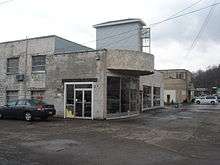Yenko Chevrolet

Yenko Chevrolet was a Chevrolet dealership located at 575 West Pike Street in Canonsburg, Pennsylvania. Operating between 1949 and 1982, the dealership is best known for selling customized muscle cars in the late 1960s. Referred to today as "Yenkos," they are among the most collectible 1960s vehicles.
History
Yenko Chevrolet's history dates back to 1929, the year Frank Yenko opened a Durant dealership. After Durant folded in 1932, Yenko opened a Chevrolet dealership in Bentleyville in 1934. In 1949, Yenko opened a second Chevrolet dealership in Canonsburg.
In 1957, Frank's son Don took over the dealership. Known for his modified Chevrolets, Don ran the dealership until 1982, at which time he sold the business.
Custom Cars
In 1966, Don Yenko was impressed enough with the late model Chevrolet Corvair's handling, and decided to apply for SCCA approval of the Corsa model for racing. The sanctioning body approved the cars with back seat removed and upgrades to the Corsa engine increasing horsepower and torque. The 100 1966 Corsas that received certification were all painted white with blue striping, and were named "Yenko Stinger".
Yenko continued to modify Corvair coupes as Stingers for the rest of the car's production run. The last Stinger was a 1969 coupe, after which Corvair production ceased for good at Willow Run, Michigan. Charlie Doerge wrote a book on the Yenko Stinger and some of Don's escapades in 2011. The book lists many original and subsequent owners, as well as known racing history with much information on all of the cars that were produced. Jay Leno in a video has declared it "the bible for Yenko Stinger owners".
When the Camaro entered the pony car fray in 1967, Yenko transplanted Chevrolet's 427 cubic inch (7 L), 425 horsepower (317 kW) L-72 engine (along with other high-performance parts) and created the Yenko Camaro. The 1967 & 1968 427 Camaros were so popular that, in 1969, Yenko used Chevrolet's Central Office Production Order (COPO) system to have L-72 engines installed into Chevrolet Camaros, Chevelles, and Novas on the factory assembly lines. Don was not a fan of the 1968 Chevelle body change but as it grew on him, he decided to offer the Yenko option on Chevelles in a very limited run. He used the 68 body that was available as a prototype before the 69 was produced. The only changes on the exterior would be to the tail lights and grille. No 68's were officially sold but there were 3 made and converted to 69's. All were re-titled as 69 Chevelles.
In 1971 Yenko sold the Chevrolet Vega Yenko Stinger II.Based on the Vega GT Hatchback, the Stinger II included front and rear spoilers and Yenko Stinger II side striping. The modified Vega aluminum-block 2.3 inline 4 with a turbocharger and 155 hp required a 50,000 test for EPA certification and Don Yenko backed out in the final hour, while Chevy did not take the hint on its marketing potential as neither the Yenko-requested higher-compression engine blocks nor factory equipped turbo engines were ever built. The Stinger II was offered from Yenko Chevrolet through 1973 without the Turbo installed, but Yenko did offer the Turbo as an aftermarket kit.
The high performance and limited production of all Yenko-modified cars makes them valuable and prized to collectors.
Production numbers
Stinger
| Corvair | |
| 1966 | 100 |
| 1967 | 25 |
| 1969 | 1 |
Super Camaro* and Super Car
| Camaro | Chevelle | Nova | |
| 1967 | 54 | ||
| 1968 | 64 | ||
| 1969 | 198 | 99 | 38 |
- *Name for 1967 and 1968 models. All 1969s were Super Cars.
Nova
| Nova | |
| 1970 | 175 |
Stinger II
| Vega | |
| 1971 | ? |
| 1972 | ? |
| 1973 | ? |
Turbo Z
| Camaro | |
| 1981 | 19 |
General Marketing Capital Inc. ownership
On October 14, 2009, General Marketing Capital Incorporated (GMCI) announced its ownership of the Yenko trademark and its plans to revitalize the brand and at SEMA 2009, unveiled the 2010 Yenko Camaro prototype.[1]
See also
References
External links
- Yenko Stinger II Vega
- Yenko dealers at Yenko.net